Hiring the best talent for your development team requires insightful and effective interview questions. This helps ensure that candidates possess the right skills and knowledge to work with Supabase, a popular open-source backend service tailored for developers.
This blog post provides a comprehensive list of Supabase interview questions segmented by experience levels: junior developers, mid-tier database administrators, and senior engineers. Additionally, we cover questions related to deployment and security, along with situational questions to help you assess top talent.
Utilize these questions to streamline your interview process and find the right fit for your team. For a more thorough assessment, consider using our PostgreSQL test before proceeding to the interview stage.
Table of contents
8 general Supabase interview questions and answers to assess candidates
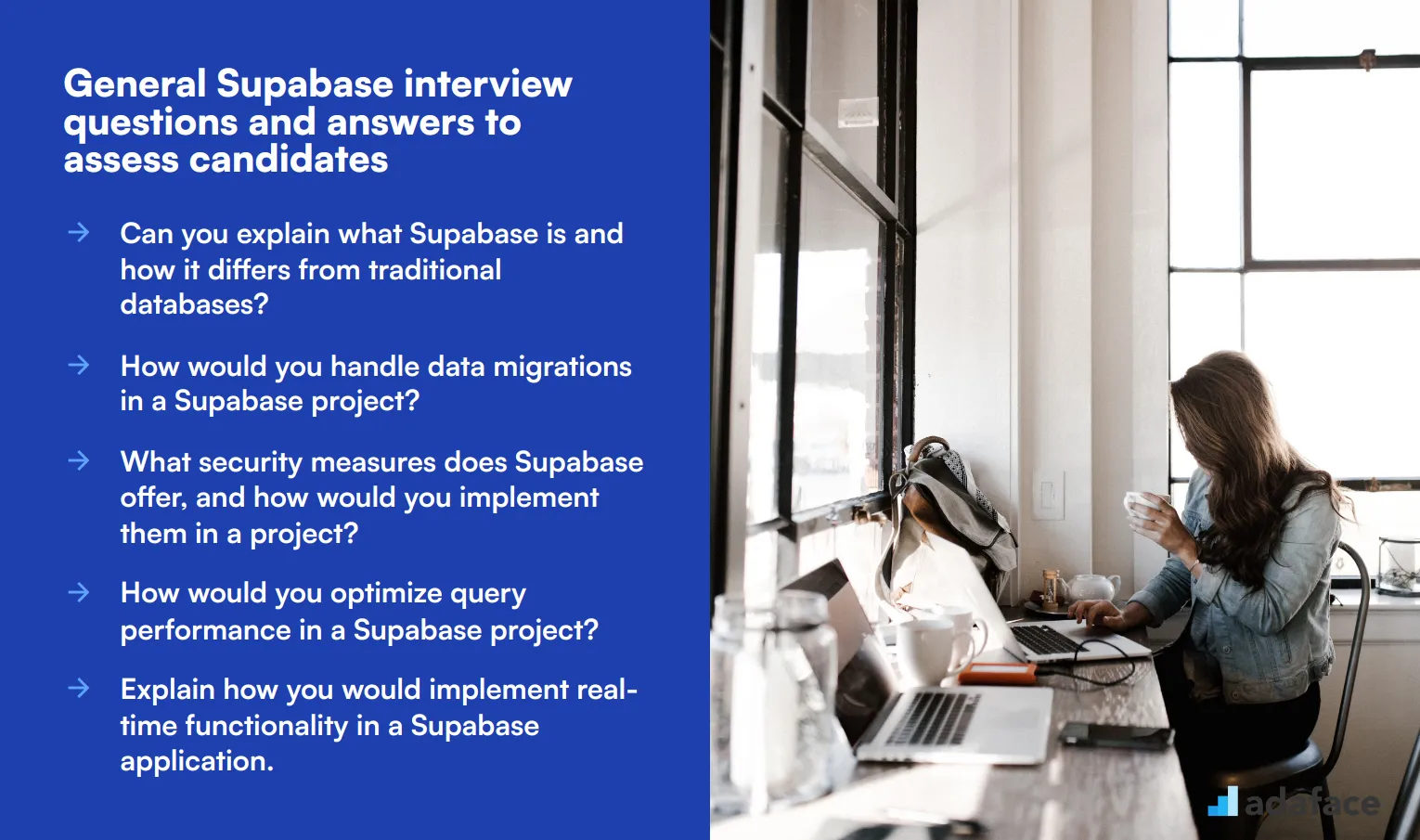
Ready to dive into the Supabase talent pool? These 8 general Supabase interview questions will help you assess candidates' understanding of this powerful open-source alternative to Firebase. Use these questions to gauge both technical knowledge and problem-solving skills, ensuring you find the right fit for your team.
1. Can you explain what Supabase is and how it differs from traditional databases?
Supabase is an open-source Firebase alternative that provides a suite of tools for building scalable and secure web and mobile applications. It combines the power of PostgreSQL with modern development tools to offer real-time databases, authentication, instant APIs, and storage solutions.
Key differences from traditional databases include:
- Real-time capabilities out of the box
- Built-in authentication and authorization
- Automatic API generation
- Serverless architecture
- Easy integration with modern frontend frameworks
Look for candidates who can articulate Supabase's unique features and understand its position in the modern development ecosystem. Strong answers will demonstrate knowledge of both traditional databases and contemporary backend-as-a-service platforms.
2. How would you handle data migrations in a Supabase project?
Handling data migrations in Supabase typically involves using the built-in migration tools and following best practices. A good approach includes:
- Creating migration files for schema changes
- Using the Supabase CLI to run migrations
- Version controlling migration files
- Testing migrations in a staging environment before production
- Backing up data before running migrations
- Using transactions for complex migrations to ensure data integrity
Ideal candidates should emphasize the importance of careful planning and testing when performing migrations. Look for those who mention the use of Supabase's migration features and understand the potential risks involved in database schema changes.
3. What security measures does Supabase offer, and how would you implement them in a project?
Supabase provides several security features to protect applications and data:
- Row-level security (RLS) policies
- JWT-based authentication
- SSL encryption for all data in transit
- Encrypted storage for sensitive data
- Role-based access control
- Two-factor authentication options
Strong candidates should discuss implementing RLS policies to restrict data access, using Supabase Auth for secure user authentication, and leveraging role-based access control for different user types. Look for answers that demonstrate an understanding of security best practices and the ability to balance security with usability in application design.
4. How would you optimize query performance in a Supabase project?
Optimizing query performance in Supabase involves several strategies:
- Proper indexing of frequently queried columns
- Using appropriate data types for columns
- Writing efficient SQL queries
- Implementing caching mechanisms
- Utilizing Supabase's real-time features judiciously
- Monitoring and analyzing query performance with Supabase's built-in tools
Look for candidates who demonstrate knowledge of both general database optimization techniques and Supabase-specific features. Strong answers might include examples of how they've optimized queries in past projects or discuss the trade-offs between real-time updates and query performance.
5. Explain how you would implement real-time functionality in a Supabase application.
Implementing real-time functionality in Supabase involves leveraging its built-in real-time features. The process typically includes:
- Setting up Realtime channels for specific tables or queries
- Using the Supabase client library to subscribe to these channels
- Implementing event listeners in the frontend to react to real-time updates
- Configuring publication and subscription rules in the database
- Optimizing the real-time setup to balance performance and data freshness
Ideal candidates should demonstrate familiarity with Supabase's real-time API and understand the concepts of pub/sub systems. Look for answers that discuss potential challenges in implementing real-time features, such as managing connection state and handling offline scenarios.
6. How would you approach testing a Supabase-backed application?
Testing a Supabase-backed application requires a comprehensive approach that covers both frontend and backend aspects:
- Unit testing of individual components and functions
- Integration testing of Supabase client interactions
- End-to-end testing of complete user flows
- API testing to ensure correct data handling
- Performance testing, especially for real-time features
- Security testing, including RLS policy verification
Strong candidates should mention tools like Jest for JavaScript testing, Cypress for end-to-end testing, and Supabase's local development setup for isolated testing environments. Look for answers that emphasize the importance of thorough testing across all layers of the application stack and mention strategies for mocking Supabase services during tests.
7. What strategies would you use to handle offline functionality in a Supabase application?
Handling offline functionality in a Supabase application involves several strategies:
- Implementing local storage or IndexedDB for offline data caching
- Using service workers for offline asset caching
- Implementing a queue system for offline actions
- Syncing local changes with the server when connectivity is restored
- Handling conflict resolution for data modified both offline and online
- Providing clear UI indicators for offline status and pending sync operations
Look for candidates who understand the challenges of building offline-capable applications and can discuss solutions specific to Supabase. Strong answers might include experiences with progressive web apps or offline-first design principles.
8. How would you approach scaling a Supabase application for high traffic?
Scaling a Supabase application for high traffic involves both frontend and backend optimizations:
- Implementing efficient caching strategies (e.g., Redis)
- Optimizing database queries and indexes
- Using read replicas for distributing read operations
- Implementing connection pooling
- Leveraging Supabase's edge functions for improved global performance
- Considering sharding for extremely large datasets
- Implementing rate limiting and request throttling
Ideal candidates should demonstrate knowledge of database scaling techniques and Supabase's specific features for handling high load. Look for answers that discuss monitoring and performance analysis as part of the scaling process, as well as considerations for cost-effective scaling in cloud environments.
20 Supabase interview questions to ask junior developers
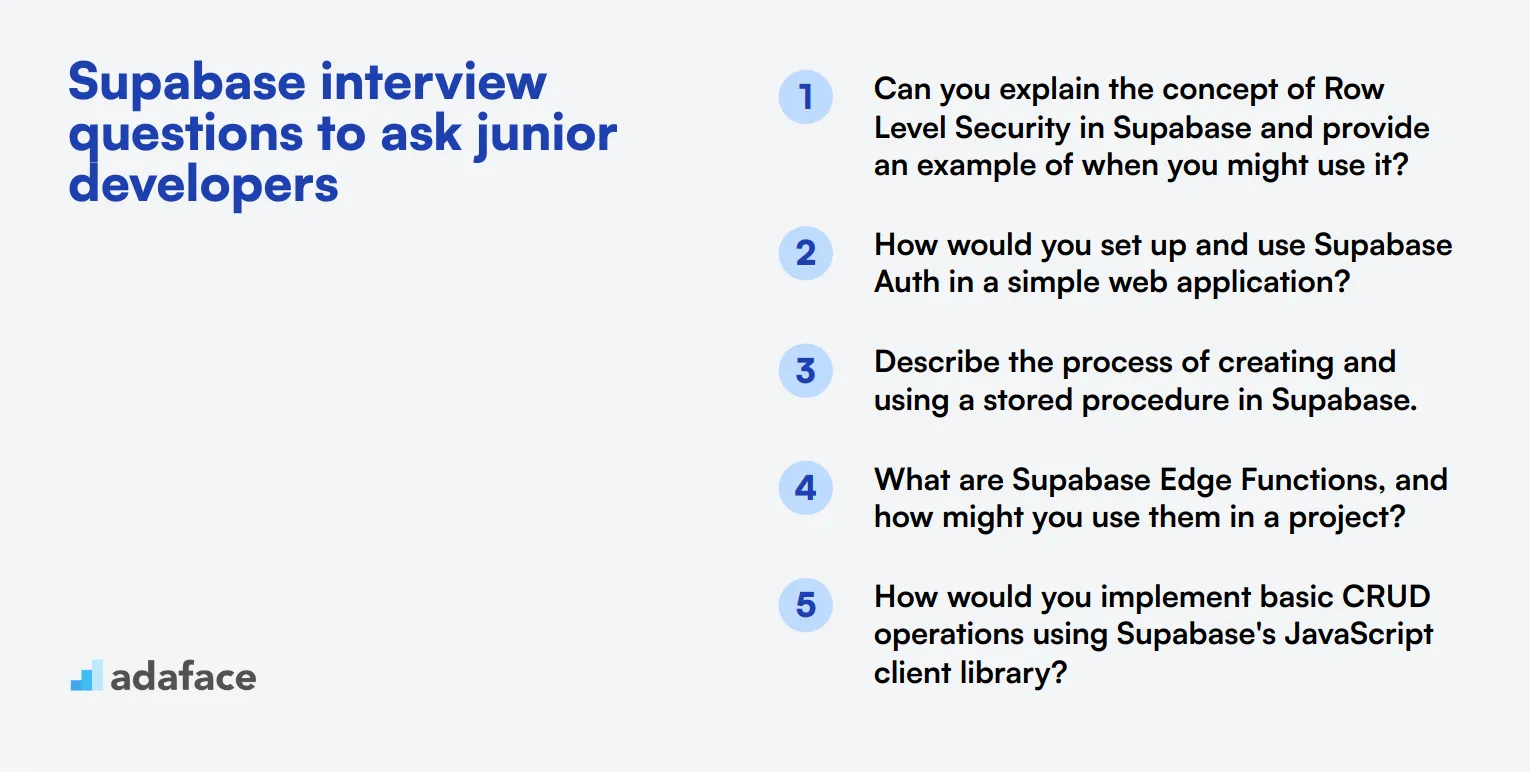
When interviewing junior developers for Supabase roles, it's crucial to assess their understanding of this powerful platform. The following questions will help you evaluate candidates' basic knowledge and practical skills with Supabase, ensuring you find the right fit for your team.
- Can you explain the concept of Row Level Security in Supabase and provide an example of when you might use it?
- How would you set up and use Supabase Auth in a simple web application?
- Describe the process of creating and using a stored procedure in Supabase.
- What are Supabase Edge Functions, and how might you use them in a project?
- How would you implement basic CRUD operations using Supabase's JavaScript client library?
- Explain the purpose of Supabase Realtime and give an example of its practical application.
- How would you handle file uploads and storage using Supabase Storage?
- What is the difference between Supabase's `select()` and `rpc()` methods, and when would you use each?
- How can you use Supabase's Postgres extensions, like pgvector, in your projects?
- Describe how you would set up and use foreign key relationships in Supabase.
- What are Supabase Policies, and how do they contribute to data security?
- How would you implement full-text search functionality using Supabase?
- Explain the concept of Database Webhooks in Supabase and provide a use case.
- How can you use Supabase's built-in GraphQL API, and what are its limitations?
- Describe the process of setting up and using database triggers in Supabase.
- How would you implement role-based access control using Supabase Auth?
- What is the purpose of Supabase's pgBouncer, and how does it benefit your application?
- How can you use Supabase's database functions to enforce business logic?
- Explain how you would implement pagination when querying data from Supabase.
- How would you approach debugging issues in a Supabase-backed application?
10 intermediate Supabase interview questions and answers to ask mid-tier database administrators.
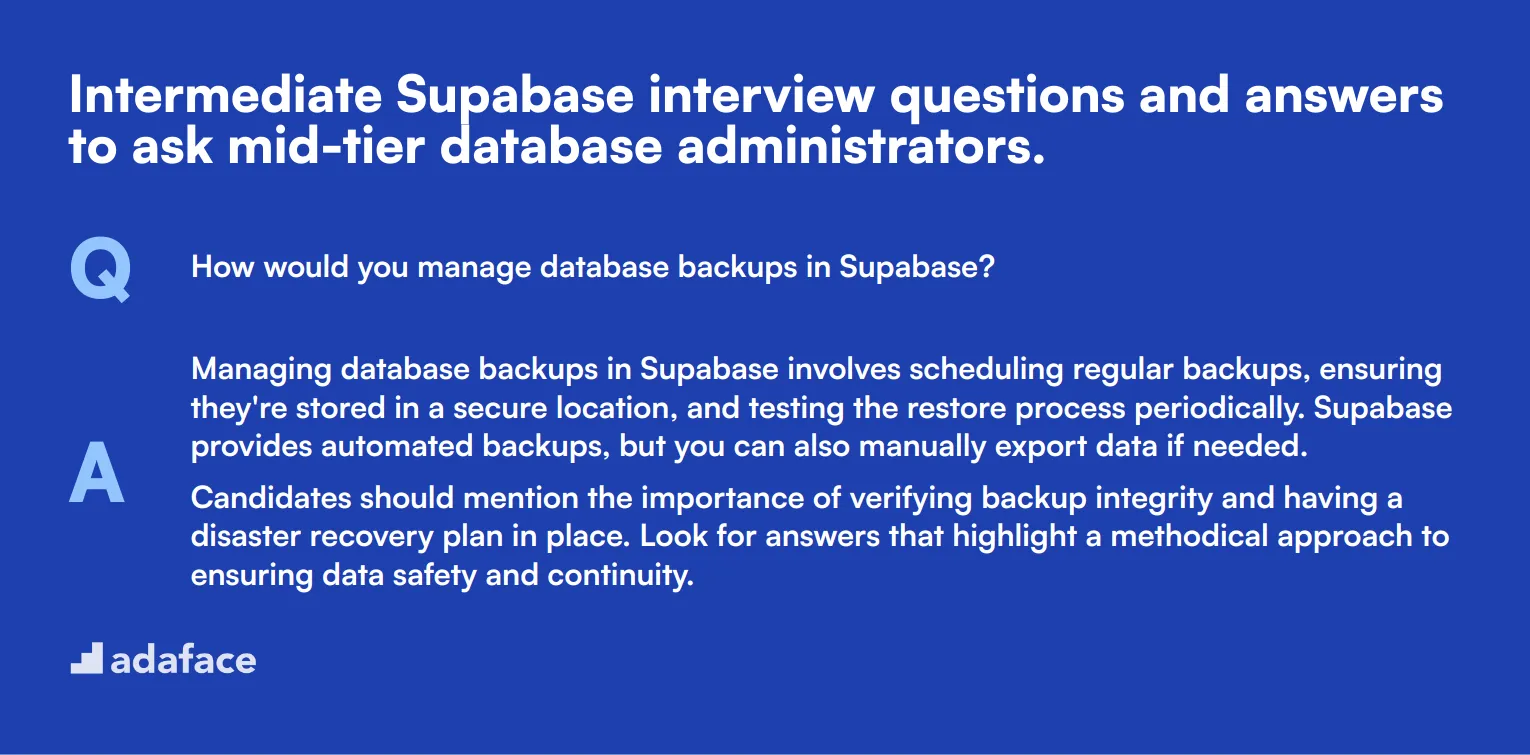
To determine whether your mid-tier database administrators possess the right skills to tackle complex tasks using Supabase, ask them some of these 10 intermediate Supabase interview questions. These questions will help you gauge their practical understanding and problem-solving capabilities.
1. How would you manage database backups in Supabase?
Managing database backups in Supabase involves scheduling regular backups, ensuring they're stored in a secure location, and testing the restore process periodically. Supabase provides automated backups, but you can also manually export data if needed.
Candidates should mention the importance of verifying backup integrity and having a disaster recovery plan in place. Look for answers that highlight a methodical approach to ensuring data safety and continuity.
2. Can you explain how to monitor database performance in Supabase?
To monitor database performance in Supabase, one should utilize built-in analytics tools and third-party monitoring services. Supabase provides metrics such as query performance, connection counts, and error rates.
Strong candidates will discuss the use of logging and alerting mechanisms to proactively identify and resolve performance issues. They should also mention the importance of continuous monitoring and optimization.
3. Describe your approach to managing Supabase database schemas.
Managing database schemas in Supabase involves planning schema changes carefully, using version control, and applying changes through migration scripts. It's crucial to ensure that schema changes are backward-compatible and are thoroughly tested before deployment.
Look for candidates who emphasize the importance of collaboration with development teams and maintaining documentation. An ideal answer will reflect a strategic and organized approach.
4. How do you ensure data consistency in a Supabase application?
Ensuring data consistency involves using transactions, setting appropriate isolation levels, and implementing constraints and triggers. Supabase's PostgreSQL foundation supports ACID properties, which help maintain data integrity.
Candidates should demonstrate a solid understanding of how to manage concurrent data operations. Look for answers that include real-world examples and a clear grasp of best practices in database consistency.
5. How would you handle database indexing in Supabase?
Database indexing in Supabase involves creating indexes on columns that are frequently used in query conditions. Proper indexing can significantly improve query performance, but it's important to balance between read and write operations.
Look for candidates who can explain the trade-offs of indexing and provide examples of how they have optimized queries in previous projects. They should also mention monitoring index usage and adjusting as needed.
6. What is your approach to managing database connections in Supabase?
Managing database connections involves monitoring and limiting the number of active connections to avoid performance bottlenecks. Supabase offers connection pooling, which helps manage resources efficiently.
Strong candidates will discuss strategies for scaling connections, such as using pgBouncer, and monitoring connection health. They should also highlight the importance of configuring connection limits and timeouts.
7. Can you explain how you would handle data partitioning in Supabase?
Data partitioning involves dividing a large database table into smaller, more manageable pieces called partitions. In Supabase, you can use table partitioning to improve query performance and manageability.
Candidates should mention different partitioning strategies such as range, list, and hash partitioning. Look for answers that include considerations for when and how to implement partitioning effectively.
8. Describe your approach to managing database roles and permissions in Supabase.
Managing database roles and permissions in Supabase involves defining roles with specific privileges and assigning them to users. This helps ensure that users have the necessary access without compromising security.
Candidates should discuss the use of least privilege principles and regular audits of permissions. Look for detailed explanations on how they manage role hierarchies and handle permission changes.
9. How do you approach data encryption in Supabase?
Data encryption in Supabase involves using SSL/TLS for data in transit and encryption mechanisms for data at rest. It's crucial to ensure that sensitive data is protected from unauthorized access.
Strong candidates will mention the importance of key management and regular security audits. Look for answers that reflect a thorough understanding of encryption practices and compliance requirements.
10. What strategies do you use for database optimization in Supabase?
Database optimization involves analyzing query performance, indexing, partitioning, and tuning configurations. In Supabase, you can use tools to monitor and optimize performance continuously.
Candidates should discuss their experience with query optimization techniques and performance tuning. Look for an understanding of how to balance various optimization strategies to achieve optimal performance.
18 advanced Supabase interview questions to ask senior engineers
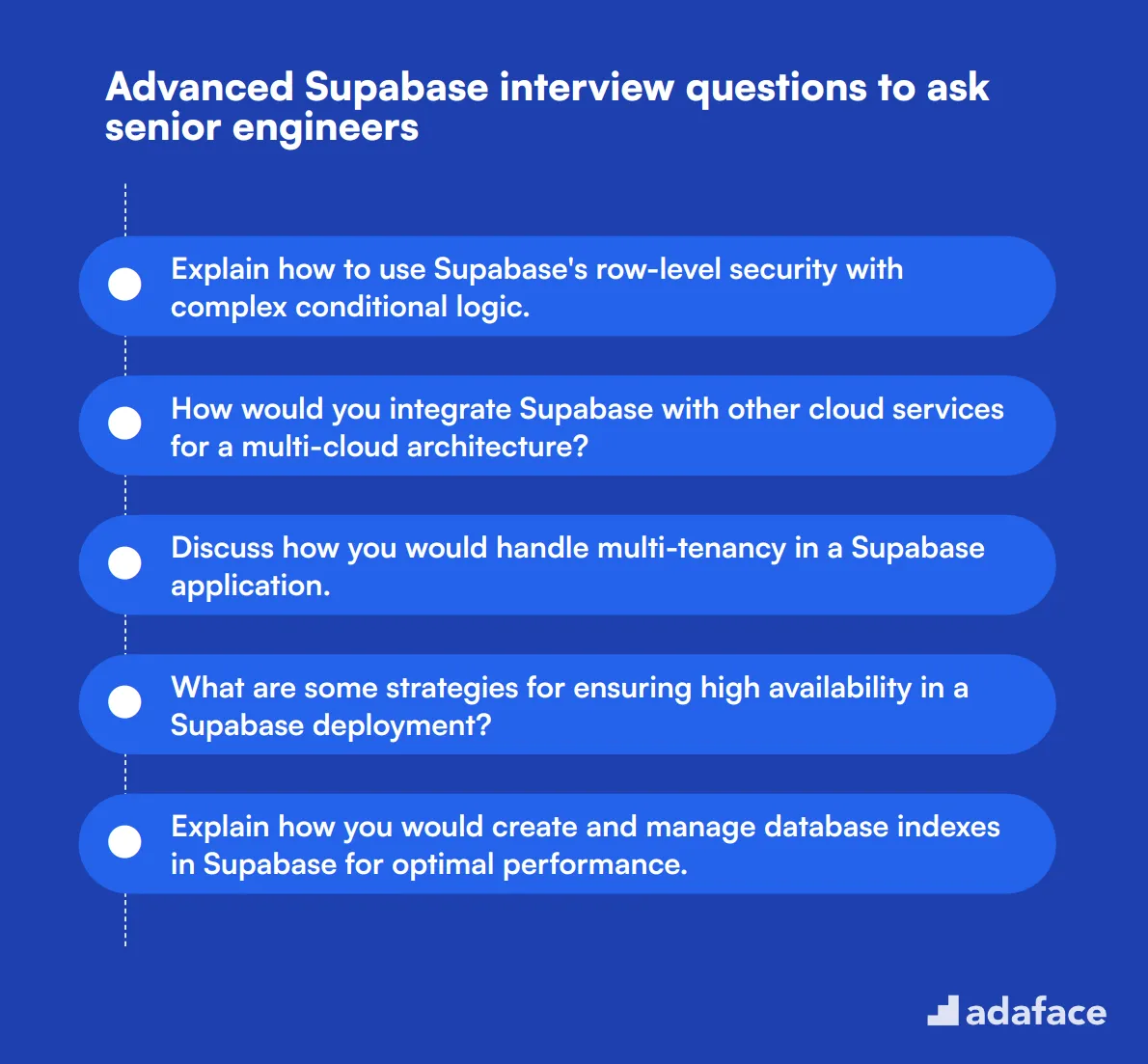
To assess whether your candidates have the advanced skills necessary to tackle complex tasks with Supabase, use some of these 18 advanced Supabase interview questions for senior engineers. This list will help you identify those who have a deep understanding of Supabase's capabilities and can effectively implement them in real-world scenarios. For more comprehensive role descriptions, check out software engineer job description.
- Explain how to use Supabase's row-level security with complex conditional logic.
- How would you integrate Supabase with other cloud services for a multi-cloud architecture?
- Discuss how you would handle multi-tenancy in a Supabase application.
- What are some strategies for ensuring high availability in a Supabase deployment?
- Explain how you would create and manage database indexes in Supabase for optimal performance.
- How would you implement a data archiving strategy using Supabase?
- Describe the process for setting up automated data synchronization between Supabase and another database.
- How do you manage and rotate API keys or secrets in a Supabase environment?
- What are the best practices for securing sensitive data in Supabase at rest and in transit?
- How would you implement Supabase's database hooks for auditing changes in your data?
- Explain how you would use Supabase's analytics capabilities to gain insights from your application's data.
- Discuss the steps you would take to recover a Supabase database after a catastrophic failure.
- How would you handle schema migrations in a live Supabase application with minimal downtime?
- Describe your approach to using Supabase functions to create complex, reusable business logic.
- Explain how you would use Supabase's caching mechanisms to improve application performance.
- How would you monitor and troubleshoot real-time events in a Supabase application?
- What strategies would you use to implement cross-database queries using Supabase?
- Discuss how you would handle compliance with data protection regulations using Supabase.
7 Supabase interview questions and answers related to deployment
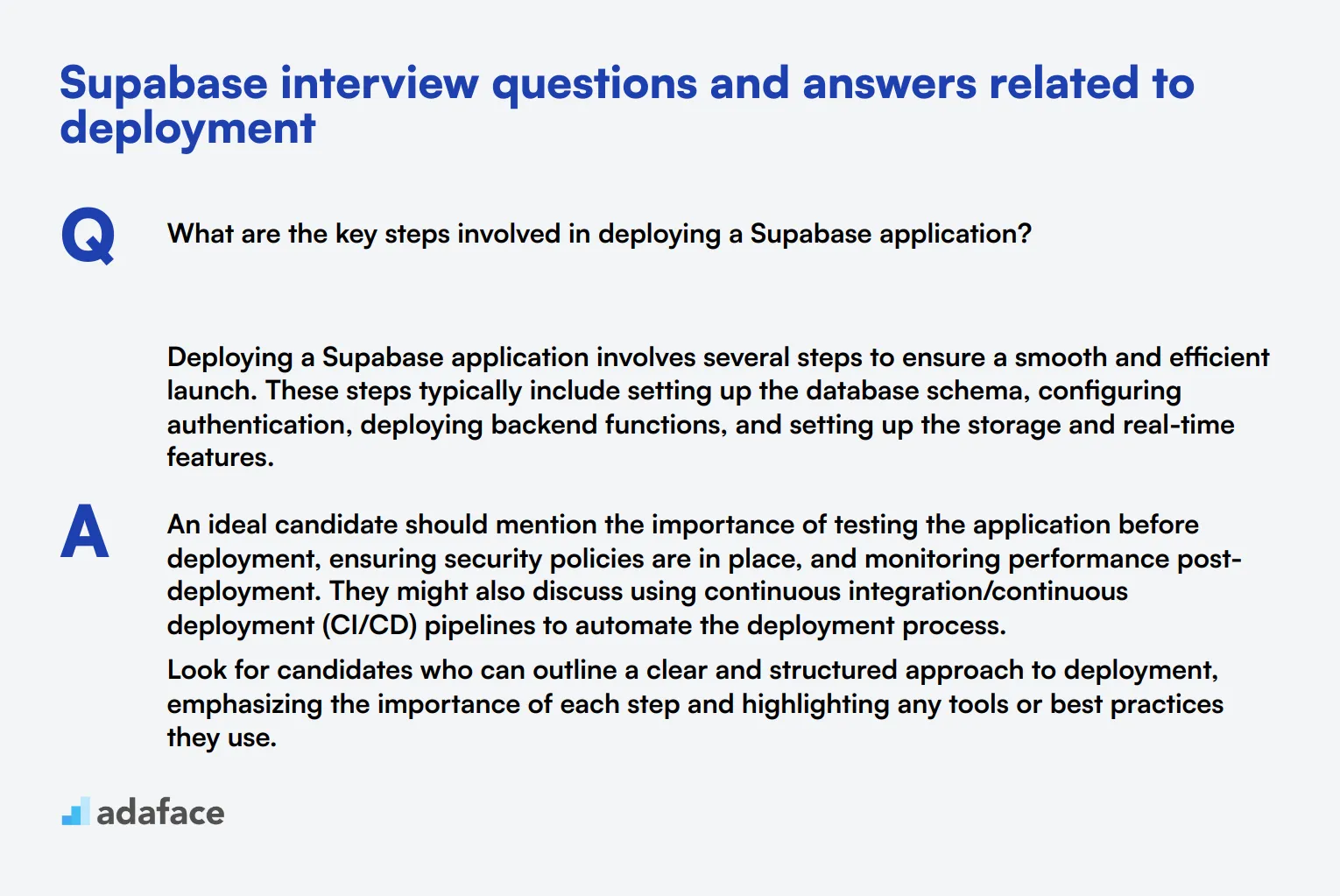
When it comes to deploying Supabase applications, having the right questions on hand can help you gauge a candidate's readiness and expertise. This list of Supabase deployment-related questions is designed to make your interview process smooth and efficient.
1. What are the key steps involved in deploying a Supabase application?
Deploying a Supabase application involves several steps to ensure a smooth and efficient launch. These steps typically include setting up the database schema, configuring authentication, deploying backend functions, and setting up the storage and real-time features.
An ideal candidate should mention the importance of testing the application before deployment, ensuring security policies are in place, and monitoring performance post-deployment. They might also discuss using continuous integration/continuous deployment (CI/CD) pipelines to automate the deployment process.
Look for candidates who can outline a clear and structured approach to deployment, emphasizing the importance of each step and highlighting any tools or best practices they use.
2. How do you ensure the security of a Supabase application during deployment?
Ensuring the security of a Supabase application during deployment involves several best practices. These include using HTTPS for data transmission, setting up environment variables securely, and implementing Supabase's built-in security features such as Row Level Security (RLS) and access control policies.
Candidates should also highlight the importance of regularly updating dependencies, conducting security audits, and using monitoring tools to detect potential vulnerabilities.
Look for responses that demonstrate a comprehensive understanding of security practices and show a proactive approach to maintaining security throughout the deployment process.
3. What strategies do you use to handle database schema changes during deployment?
Handling database schema changes during deployment requires careful planning to avoid disrupting the application. Strategies can include using migration tools to apply incremental changes, testing schema changes in a staging environment before production, and having a rollback plan in case of issues.
Candidates should emphasize the importance of version control for database schemas and may mention tools like Flyway or Liquibase for managing migrations.
An ideal response will showcase a methodical approach to managing schema changes, ensuring minimal downtime and data integrity during the deployment process.
4. How do you monitor the performance of a Supabase application post-deployment?
Monitoring the performance of a Supabase application post-deployment involves using various tools and techniques to track key metrics such as query performance, server response times, and resource utilization. Supabase provides built-in monitoring tools, but integrating external services like New Relic or Grafana can offer more detailed insights.
Candidates should discuss setting up alerts for unusual activity, regularly reviewing logs, and using performance analytics to identify potential bottlenecks.
Look for candidates who can explain their monitoring setup clearly and show how they proactively address performance issues to ensure the application's smooth operation.
5. What are the best practices for managing environment variables in a Supabase deployment?
Managing environment variables in a Supabase deployment involves storing sensitive information securely and ensuring they are easily configurable for different environments (development, staging, production). Tools like dotenv or environment variable managers in CI/CD pipelines can help manage this effectively.
Candidates should highlight their strategies for keeping environment variables out of version control, using secret management services, and updating variables without requiring a full redeployment.
An ideal response will demonstrate attention to security and ease of management, showing a clear understanding of best practices in handling environment variables.
6. How do you handle rollback procedures in case of deployment failures?
Handling rollback procedures involves having a well-defined plan to revert to a previous stable state in case of deployment failures. This can include using version control to rollback code changes, database snapshots for reverting schema or data changes, and automated backups.
Candidates should explain the importance of testing rollback procedures in staging environments and having clear documentation to guide the process.
Look for responses that show a proactive approach to planning for failures, ensuring minimal downtime and data loss during the rollback process.
7. What are some challenges you have faced during Supabase deployments, and how did you overcome them?
Candidates may mention challenges such as handling data migrations without downtime, managing environment-specific configurations, or dealing with unexpected performance issues post-deployment. Solutions might include using zero-downtime deployment techniques, robust testing frameworks, and performance monitoring tools.
An ideal candidate will provide specific examples of challenges they've faced, the steps they took to address them, and the outcomes of their actions.
Look for responses that demonstrate problem-solving skills, adaptability, and a proactive approach to overcoming deployment challenges.
9 Supabase interview questions and answers related to security
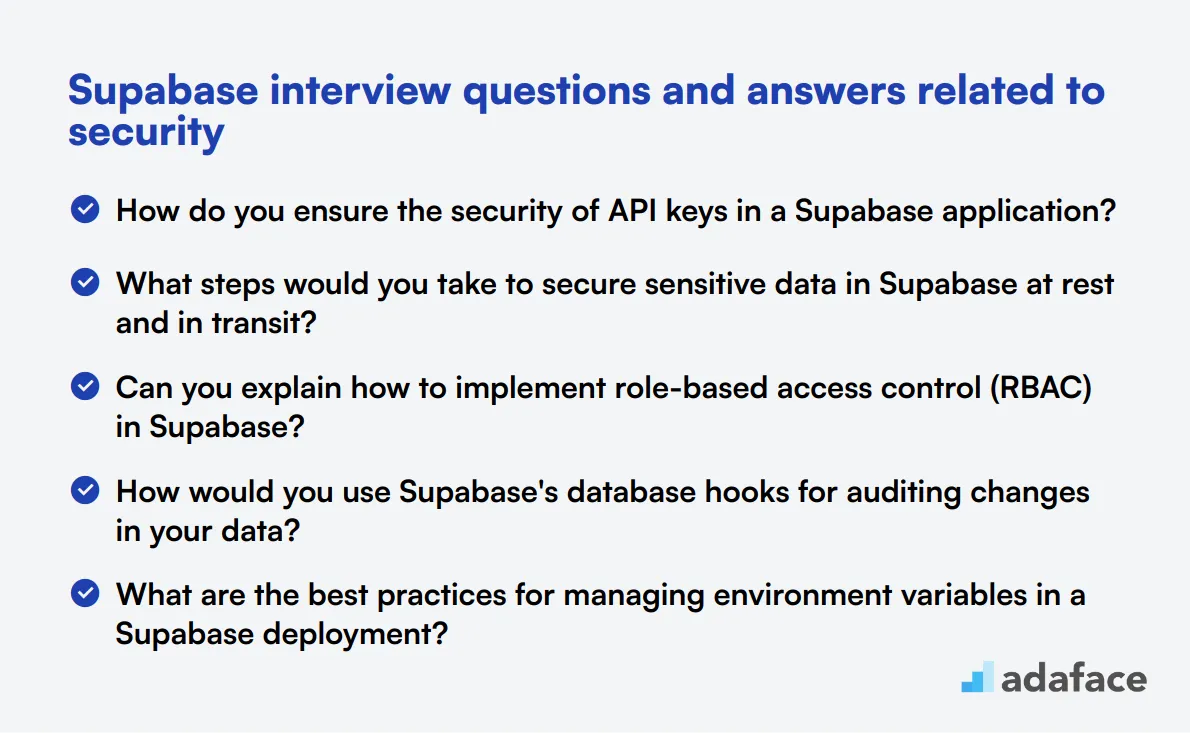
To determine whether your applicants have a robust understanding of security within Supabase, use these interview questions. This list will help you identify candidates who can effectively manage and secure your Supabase environment, ensuring data integrity and protection.
1. How do you ensure the security of API keys in a Supabase application?
To ensure the security of API keys in a Supabase application, candidates should mention using environment variables to store the keys securely. This prevents hardcoding keys directly into the source code, which can be a significant security risk.
They might also discuss regularly rotating API keys and implementing access controls to limit key usage to only necessary parts of the application.
Look for candidates who understand the importance of keeping API keys confidential and employing best practices for secure key management.
2. What steps would you take to secure sensitive data in Supabase at rest and in transit?
To secure sensitive data at rest, candidates should mention encrypting the database using Supabase's built-in encryption mechanisms. Data encryption ensures that even if unauthorized users gain access to the database, they cannot read the sensitive information.
For data in transit, they should discuss using HTTPS to encrypt data transmitted between the client and the server. This prevents interception and eavesdropping by malicious actors.
Ideal responses will show a comprehensive understanding of encryption and secure transmission protocols. Look for knowledge of both encryption at rest and in transit.
3. Can you explain how to implement role-based access control (RBAC) in Supabase?
Role-based access control (RBAC) in Supabase involves defining roles and assigning permissions to these roles based on the actions users are allowed to perform. Candidates should mention creating roles within the database and then associating users with these roles.
They should also discuss configuring policies and permissions for each role to ensure that users can only access the data necessary for their role.
Strong candidates will be able to explain the importance of RBAC in limiting access and enhancing security by ensuring users have the minimum required permissions.
4. How would you use Supabase's database hooks for auditing changes in your data?
Supabase's database hooks can be used to monitor and audit changes in data by creating triggers that log changes to specific tables. Candidates should mention setting up triggers to capture events such as INSERT, UPDATE, and DELETE.
They might also discuss storing audit logs in a separate table to keep a history of changes, which can be reviewed for security and compliance purposes.
Look for candidates who understand the value of audit logs in tracking data changes and ensuring accountability within the application.
5. What are the best practices for managing environment variables in a Supabase deployment?
Managing environment variables effectively can ensure the security and manageability of a Supabase deployment. Candidates should mention storing environment variables outside the source code and using secret management tools or services to manage them securely.
They should also discuss the importance of using different sets of environment variables for different environments (development, staging, production) to prevent accidental leaks or misuse.
Ideal candidate responses will highlight the significance of securing environment variables and the benefits they bring in maintaining a secure and organized deployment environment.
6. Explain how you would monitor and troubleshoot real-time events in a Supabase application.
Monitoring real-time events in a Supabase application can be achieved by setting up logging and alert mechanisms. Candidates should mention using Supabase's built-in logging features to track real-time events and errors.
They might also discuss integrating third-party monitoring tools to get real-time insights and alerts when specific events or errors occur.
Look for candidates who can articulate a proactive approach to monitoring and troubleshooting, ensuring the application runs smoothly and securely.
7. How would you handle compliance with data protection regulations using Supabase?
Handling compliance with data protection regulations involves ensuring that the Supabase deployment adheres to relevant legal frameworks such as GDPR or CCPA. Candidates should mention implementing data encryption, maintaining audit logs, and ensuring data subject rights are respected.
They might also discuss regular compliance audits and updates to privacy policies to align with evolving regulations.
Strong candidates will demonstrate a thorough understanding of data protection regulations and how to implement compliance measures effectively within Supabase.
8. Discuss the steps you would take to recover a Supabase database after a catastrophic failure.
Recovering a Supabase database after a catastrophic failure involves several steps, starting with regular backups. Candidates should mention setting up automated backup schedules and ensuring that backups are stored securely.
In the event of a failure, they should discuss the process of restoring the database from the most recent backup and verifying the integrity of the restored data.
Ideal responses will show a clear recovery plan, emphasizing the importance of regular backups and having a tested restoration process in place.
9. How do you ensure the security of a Supabase application during deployment?
Ensuring security during deployment involves several best practices, such as using secure CI/CD pipelines, encrypting sensitive environment variables, and performing security checks before deploying to production.
Candidates should also mention conducting regular security audits and reviews to identify and mitigate potential vulnerabilities.
Look for candidates who can articulate a comprehensive approach to deployment security, emphasizing the need for ongoing security measures throughout the deployment process.
8 situational Supabase interview questions with answers for hiring top developers
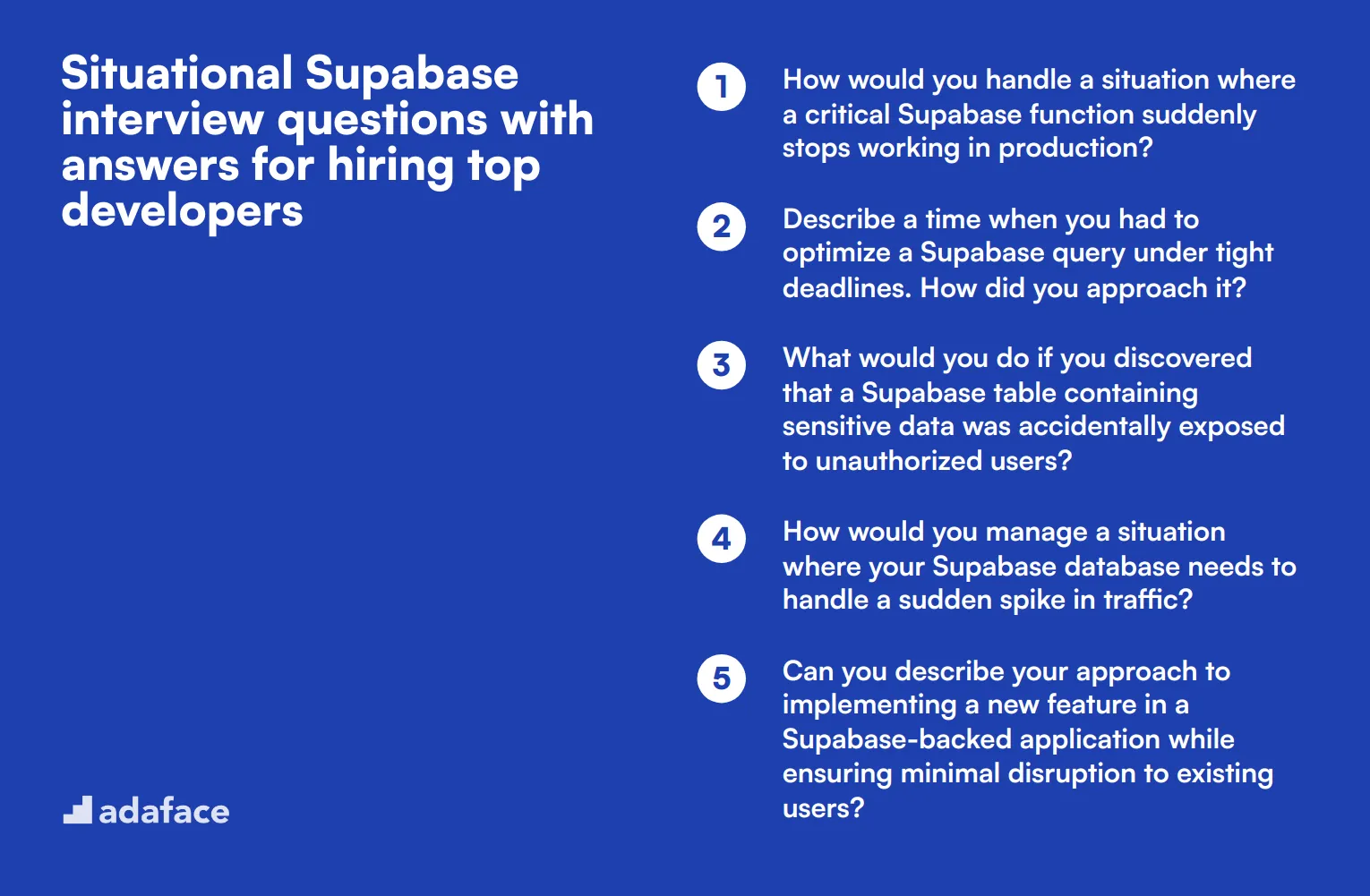
To determine whether your candidates can navigate real-world challenges using Supabase, ask them some of these situational interview questions. This set of questions helps you understand how applicants think, solve problems, and apply their knowledge to practical scenarios.
1. How would you handle a situation where a critical Supabase function suddenly stops working in production?
First, I would identify and isolate the issue by checking logs and error messages. Then, I would assess whether it's a code issue, a configuration problem, or an infrastructure failure. Depending on the severity, I might roll back to a previous stable version while investigating further.
Next, I would use Supabase's monitoring tools to gather more information and possibly replicate the issue in a staging environment. If the problem is related to a third-party service, I would reach out to their support team while implementing a temporary workaround.
An ideal candidate should demonstrate a methodical approach to problem-solving under pressure. Look for their ability to prioritize tasks and maintain clear communication with team members during a crisis.
2. Describe a time when you had to optimize a Supabase query under tight deadlines. How did you approach it?
I would start by identifying the slow queries using Supabase's query performance tools. Analyzing the query execution plan can provide insights into which parts of the query are causing delays. Often, issues like missing indexes or inefficient joins can be the culprits.
After pinpointing the problem, I would optimize the query by adding appropriate indexes, rewriting parts of the query for efficiency, or breaking down complex queries into simpler, more manageable ones. I would then test the optimized query in a staging environment to ensure it meets performance expectations.
Recruiters should look for candidates who can explain specific techniques and tools they used in the past to optimize queries. Their response should reflect a deep understanding of database performance tuning.
3. What would you do if you discovered that a Supabase table containing sensitive data was accidentally exposed to unauthorized users?
First, I would immediately revoke access to the table and investigate the scope of the exposure. I would check logs to understand how and when the data was accessed and by whom. Once the immediate risk is mitigated, I would notify relevant stakeholders and follow any legal or regulatory requirements for data breaches.
Next, I would review and strengthen the security policies to prevent future incidents. This might include implementing row-level security, revising access controls, and conducting a thorough audit of permissions and roles.
Look for a candidate who not only addresses the immediate issue but also outlines a proactive approach to preventing future breaches. Their response should show an understanding of data security best practices.
4. How would you manage a situation where your Supabase database needs to handle a sudden spike in traffic?
Preparation is key. I would ensure that the database is properly indexed and optimized for read-heavy workloads. Implementing caching strategies can also help reduce the load on the database. During the traffic spike, I would monitor performance metrics closely and scale up the database resources if necessary.
Additionally, I would use Supabase's built-in tools to distribute the load more effectively, such as connection pooling and read replicas. After the spike, I would analyze the traffic patterns to identify any long-term adjustments needed for future scalability.
An ideal candidate should demonstrate a comprehensive understanding of scaling strategies and performance monitoring. They should also emphasize the importance of proactive planning and continuous improvement.
5. Can you describe your approach to implementing a new feature in a Supabase-backed application while ensuring minimal disruption to existing users?
First, I would plan the feature implementation carefully, breaking it down into smaller, manageable tasks. I would use feature flags to gradually roll out the new feature to a subset of users, allowing me to monitor its performance and gather feedback without affecting all users.
I would also ensure that all changes are thoroughly tested in a staging environment before deployment. This includes unit tests, integration tests, and user acceptance testing. Continuous Integration/Continuous Deployment (CI/CD) pipelines can help automate these tests and ensure a smooth deployment process.
The candidate should emphasize the importance of careful planning, testing, and monitoring when implementing new features. Look for their ability to use tools and strategies to minimize risks and disruptions.
6. How would you handle a request to integrate Supabase with another cloud service as part of a multi-cloud architecture?
First, I would evaluate the technical requirements and capabilities of both Supabase and the other cloud service. Understanding the APIs, data formats, and security protocols involved is crucial. I would then design an integration strategy that ensures seamless communication and data transfer between the services.
I would use middleware or cloud functions to handle the integration logic, ensuring that data is securely and efficiently transferred between Supabase and the other service. Additionally, I would implement monitoring and logging to track the integration's performance and identify any issues promptly.
An ideal candidate should demonstrate an understanding of multi-cloud architectures and the complexities involved in integrating different services. They should also highlight their ability to design and implement robust, scalable integration solutions.
7. What would you do if you encountered a performance bottleneck in a Supabase application during peak usage hours?
I would start by identifying the root cause of the bottleneck using performance monitoring tools. This might involve analyzing slow queries, checking for resource contention, or reviewing application logs. Once the issue is identified, I would take steps to mitigate it, such as optimizing queries, increasing resource allocation, or implementing caching strategies.
If the bottleneck persists, I would consider scaling the application horizontally by adding more instances or using read replicas to distribute the load. Post-incident, I would conduct a thorough analysis to identify any long-term improvements needed to prevent similar issues in the future.
Look for a candidate who can explain a systematic approach to diagnosing and resolving performance issues. Their response should demonstrate a balance between immediate problem-solving and long-term optimization strategies.
8. How would you approach a scenario where you need to migrate a large dataset from another database to Supabase without significant downtime?
I would start by planning the migration process in detail, including data mapping, transformation, and validation. Using tools like data replication or ETL (Extract, Transform, Load) pipelines can help automate and streamline the migration process. I would also consider performing the migration in phases to minimize downtime.
To ensure data integrity, I would run comprehensive tests before the actual migration, including data consistency checks and performance benchmarks. During the migration, I would monitor the process closely and have a rollback plan in place in case any issues arise.
The candidate should demonstrate a thorough understanding of data migration techniques and emphasize the importance of planning, testing, and monitoring. Look for their ability to balance efficiency with data integrity and minimal disruption.
Which Supabase skills should you evaluate during the interview phase?
While no single interview can fully capture the breadth of a candidate's capabilities, focusing on key skills crucial to Supabase can provide a clearer picture of their potential fit and proficiency. In this segment, we'll explore the core skills essential to evaluate during the interview phase to ensure candidates not only understand Supabase but can effectively utilize it in real-world scenarios.
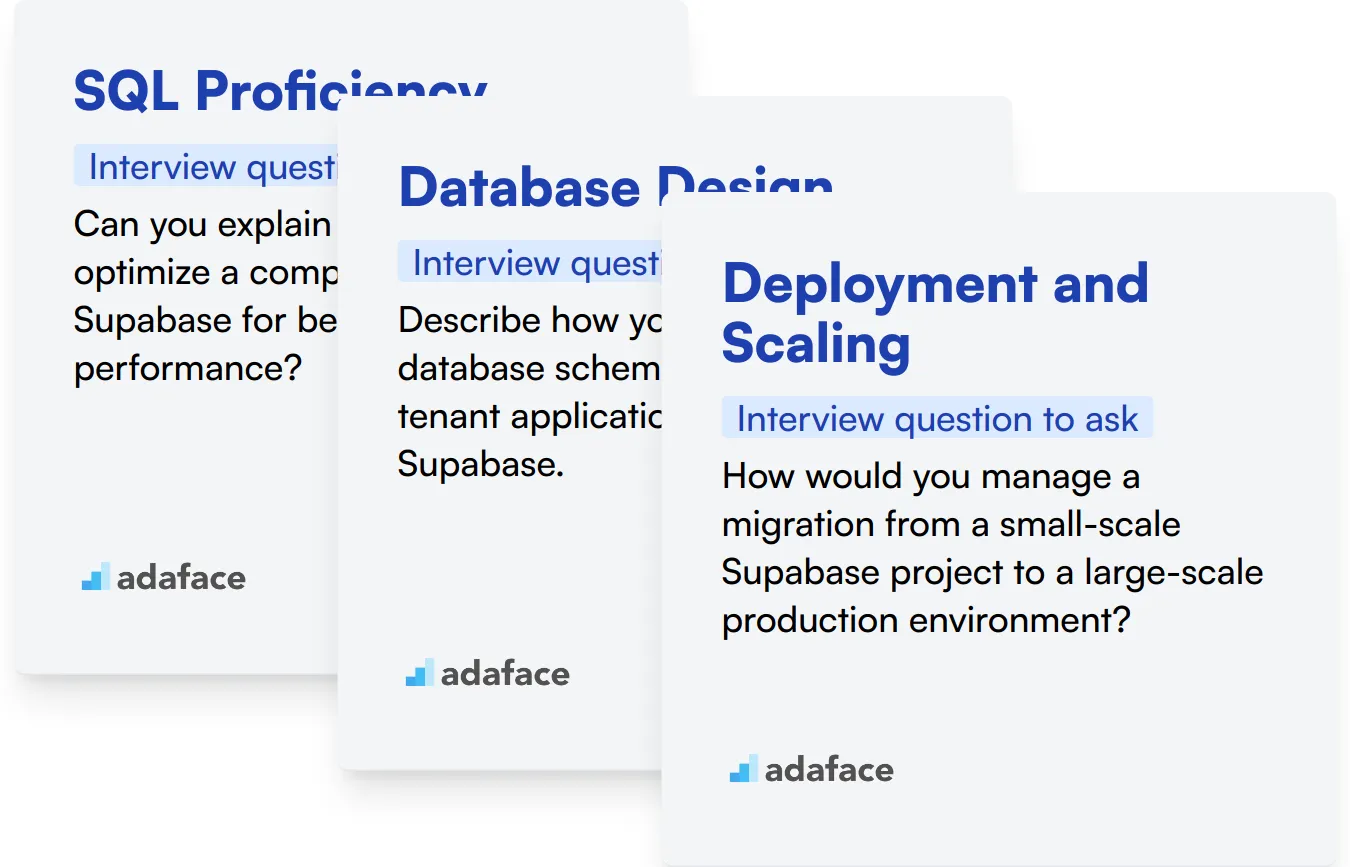
SQL Proficiency
Strong SQL skills are paramount when working with Supabase, as it relies heavily on SQL for database manipulation and query execution. A candidate skilled in SQL will be able to leverage Supabase's capabilities to build efficient, scalable applications.
Consider using a targeted assessment test to gauge SQL proficiency. For comprehensive evaluation, our SQL online test can be an effective tool to filter candidates based on their SQL expertise.
To further assess SQL skills in the context of Supabase, pose specific interview questions that reflect typical tasks they might handle.
Can you explain how you would optimize a complex SQL query in Supabase for better performance?
Look for answers that demonstrate understanding of query optimization techniques such as indexing, query restructuring, or using EXPLAIN statements. Effective responses should show a strategic approach to boosting query efficiency.
Database Design
Database design expertise is critical for structuring data in ways that are both efficient and scalable within Supabase environments. This skill ensures that the database schema aligns well with the application requirements and performs optimally.
To evaluate a candidate's abilities in database design, consider asking questions that reveal their approach to schema design and their reasoning behind certain choices.
Describe how you would design a database schema for a multi-tenant application using Supabase.
Effective responses should demonstrate a thoughtful consideration of scalability, data isolation, and security. Candidates should articulate why their design choices fit well with Supabase's capabilities and constraints.
Deployment and Scaling
Understanding of deployment processes and scalability strategies in Supabase is essential, as it directly affects application performance and reliability. This skill is important for ensuring that the Supabase instance can handle growth and varying loads efficiently.
To delve deeper into this skill area during interviews, you might want to ask practical questions regarding deployment scenarios.
How would you manage a migration from a small-scale Supabase project to a large-scale production environment?
Look for responses that encompass strategies like gradual scaling, performance testing, and monitoring. Candidates should demonstrate a proactive approach to dealing with potential scalability and deployment challenges.
3 Essential Tips for Leveraging Supabase Interview Questions Effectively
As you prepare to put the Supabase interview questions to use, here are three essential tips to ensure your interview process is as effective as possible.
1. Incorporate Skills Tests Before Conducting Interviews
Before you dive into using Supabase interview questions, it's beneficial to filter candidates through skill assessments. This preliminary step ensures that only the most promising candidates progress to the interview stage, thereby optimizing your recruitment process.
For roles involving Supabase, consider using skill tests such as SQL, PostgreSQL, and JavaScript, as these are directly relevant to tasks they'll handle. This targeted approach helps in assessing crucial technical skills upfront.
Applying these tests early helps in identifying candidates who possess the necessary technical expertise, thereby increasing the likelihood of successful hires. This strategic screening paves the way for a more focused and in-depth use of Supabase interview questions during the actual interviews.
2. Strategically Compile Your Interview Questions
Time is limited in interviews, making it critical to choose your questions wisely to cover all necessary skills and competencies. Focus on crafting a list that evaluates candidates on key aspects crucial for the role.
Integrating questions from other domains can provide a comprehensive understanding of a candidate’s capabilities. For instance, consider including questions from React or TypeScript if the role demands front-end skills, enhancing the relevancy of your interview process.
Effective questioning ensures a thorough evaluation, helping you gauge not just technical skills but also how well candidates may fit within your team and culture.
3. Always Follow Up with Probing Questions
While a well-structured initial question is critical, follow-up questions are what truly reveal a candidate's depth of understanding and authenticity. These inquiries help you discern if a candidate’s initial responses are rehearsed or genuinely indicative of their skill level and thought process.
For example, after a candidate explains how they use Supabase for data management, you could follow up with, 'Can you describe a challenge you faced while integrating Supabase with other services and how you overcame it?' This type of question helps you understand their problem-solving skills and adaptability.
Evaluate Supabase skills with targeted interview questions and tests
If you're looking to hire someone with Supabase skills, it's important to assess their abilities accurately. The most effective way to do this is by using skill tests. Consider using Adaface's SQL test or PostgreSQL test to evaluate candidates' database skills.
After using these tests to shortlist the best applicants, you can call them for interviews. To streamline your hiring process and find top Supabase talent, check out our online assessment platform. It offers a range of tools to help you make informed hiring decisions.
SQL Online Test
Download Supabase interview questions template in multiple formats
Supabase Interview Questions FAQs
General questions include topics on Supabase architecture, main features, and key advantages over other databases.
For junior developers, focus on basic SQL operations, understanding of Supabase functionalities, and simple project experiences.
Ask about their experience with database optimization, backup strategies, and handling intermediate-level database issues.
Inquire about their knowledge of deployment processes, version control, rollback strategies, and CI/CD integration.
Focus on questions about database encryption, role-based access control, and best practices for ensuring data security.
Yes, they help gauge a candidate’s problem-solving skills and how they handle real-world scenarios using Supabase.

40 min skill tests.
No trick questions.
Accurate shortlisting.
We make it easy for you to find the best candidates in your pipeline with a 40 min skills test.
Try for freeRelated posts
Free resources




